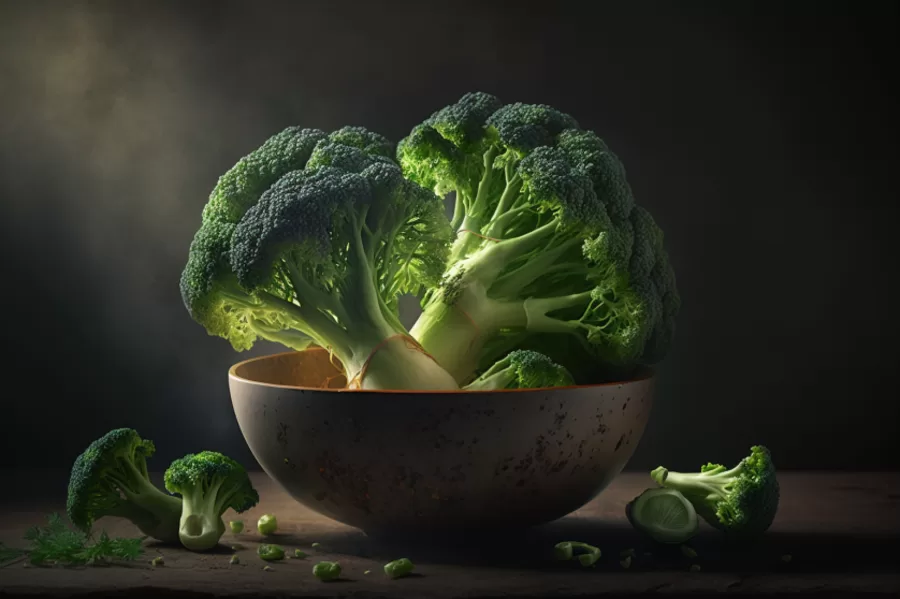A cruciferous vegetable called broccoli has attracted a lot of attention recently because of its many health advantages. Among its numerous benefits, broccoli is renowned for its capacity to facilitate the body’s detoxification procedures. We will examine the significance of broccoli in detoxifying and how it might improve general health and wellbeing in this post.
Detoxification: Why Is It Important?
The process of detoxification is how the body gets rid of toxins and hazardous compounds that have accumulated as a result of numerous environmental variables, dietary decisions, and lifestyle behaviors. For a person to remain in good health, their detoxification system must be operating properly. It improves general wellness, maintains organ function, and aids in the removal of toxins from the body.
What Makes Broccoli a Detoxifying Superfood?
Broccoli is a powerhouse of nutrients and compounds that aid in the detoxification process. It contains a unique combination of phytochemicals, vitamins, minerals, and fiber, making it an excellent addition to any detoxifying regimen.
Efficacy of Sulforaphane
The powerful antioxidant and detoxifying agent sulforaphane is one of the important substances present in broccoli. Specific enzymes in the body are activated by sulforaphane to aid in the removal of toxic chemicals and provide protection against oxidative stress. Sulforaphane boosts the body’s natural detoxification pathways, especially those that are involved in phase II detoxification activities, according to studies.
Antioxidant Properties of Broccoli
Broccoli is rich in antioxidants, such as vitamin C, beta-carotene, and various flavonoids. These antioxidants help neutralize free radicals, which are unstable molecules that can cause damage to cells and DNA. By reducing oxidative stress, broccoli’s antioxidants contribute to the overall detoxification process and help maintain cellular health.
Liver and Broccoli Detoxification
By digesting and removing toxins from the body, the liver plays a critical part in detoxification. Compounds in broccoli help the liver work properly and increase its ability for detoxification. Broccoli contains glucosinolates, which increase the liver’s detoxification-related enzymes. The high fiber content of broccoli also supports regular bowel movements and the removal of waste materials, further promoting liver function.
Broccoli’s Gut-Health Promoting Effects
Effective detoxification requires a healthy gut. Fiber in broccoli serves as a prebiotic, feeding healthy gut microorganisms. These microorganisms are crucial for the body’s metabolization and removal of poisons. Broccoli helps digestive health and the entire detoxification process by fostering a healthy gut microbiota.
Cancer Prevention and Cleansing
According to research, broccoli may help lower the chance of developing certain cancers because of its detoxifying capabilities. Particularly, sulforaphane has been thoroughly investigated for its possible anti-cancer properties. It may influence a number of cancer-related signaling pathways, including detoxification processes. Including broccoli in your diet might be a helpful cancer prevention technique.
Broccoli’s Role in Skin Health
Detoxification also plays a significant role in maintaining healthy skin. Broccoli’s rich array of antioxidants, vitamins, and minerals can help protect the skin against oxidative stress and promote a radiant complexion. Additionally, the phytochemicals in broccoli may have anti-inflammatory properties, which can contribute to reducing skin inflammation and improving overall skin health.
Boosting the Immune System with Broccoli
A strong immune system is crucial for defending against toxins and pathogens. Broccoli contains immune-boosting nutrients, such as vitamin C, beta-carotene, and zinc, which help support the immune system. By enhancing immune function, broccoli aids in the body’s natural detoxification processes and overall defense against harmful substances.
Incorporating Broccoli into Your Diet
To reap the detoxifying benefits of broccoli, it is important to incorporate it into your daily diet. Here are some practical tips for adding broccoli to your meals:
- Steam or lightly sauté broccoli to retain its nutritional value.
- Include broccoli in stir-fries, salads, or soups for added flavor and nutrition.
- Try roasting broccoli with a sprinkle of olive oil and your favorite herbs for a delicious and healthy side dish.
- Blend broccoli into smoothies or add it to omelets for a nutrient-packed boost.
Broccoli Supplements: Are They Effective?
While consuming fresh broccoli is the best way to obtain its benefits, broccoli supplements are also available. However, it’s important to note that supplements may not provide the same synergistic effects as whole foods. If you choose to use broccoli supplements, consult with a healthcare professional to ensure they are suitable for you and your specific health goals.
Potential Side Effects and Precautions
While broccoli is generally safe for consumption, it may cause digestive discomfort in some individuals, particularly when eaten in large quantities. Additionally, people taking blood-thinning medications should moderate their broccoli intake due to its high vitamin K content. As always, it is recommended to consult with a healthcare professional before making any significant changes to your diet.
FAQ
Can broccoli help with weight loss?
Broccoli is a low-calorie and high-fiber vegetable, which can aid in weight loss by promoting satiety and supporting healthy digestion.
Can I consume broccoli if I have a thyroid condition?
Yes, you can consume broccoli if you have a thyroid condition. However, individuals with hypothyroidism should moderate their intake, as excessive consumption of raw cruciferous vegetables may interfere with thyroid function.
Is it better to eat broccoli raw or cooked?
Both raw and cooked broccoli offer health benefits. However, lightly steaming or sautéing broccoli can help improve its digestibility and enhance nutrient absorption.
Can children eat broccoli?
Yes, broccoli is safe for children to consume. It is a nutritious vegetable that can be introduced as part of a balanced diet from an early age.







